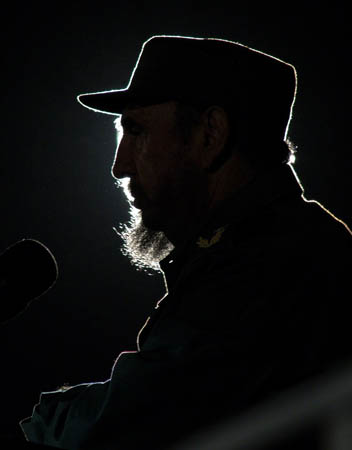This video is a poem performed by Ty Gray El. I was forwarded it and thought it’s a good watch. I’m embedding the video, watch it, then read my comment below please.
But what, besides “her man”, makes the Black woman smile? I’m with 90 percent of the message, but the “Black man” come back and take responsibility ending was not my cup of tea. Your thoughts?
“The tragedy of the black bourgeoisie in America is not that it simply “sells out,” since all bourgeois classes are prone to compromise their sovereignty in a crisis. It is rather that no class the world over sells out so cheaply as the American black bourgeoisie …”
-Harold Cruse from The Crisis of the Negro Intellectual: A Historical Analysis of the Failure of Black Leadership
Each year, Black History Month is ushered in with mild fanfare from Black folks and Whites. As some of my students told me, “We probably don’t need it anymore because we learned it all in school already.” (Don’t worry I took me about 2 minutes to blow that assertion out of the water) Still, I think it’s important to contribute to the work that our ancestor Carter G. Woodson initiated. Black History has been and should be a living history. With that being said, I’ve decided to contribute to the project. All too often, we compartmentalize the utility of our history. “Teach the children their history so they know who they are(were).” History must apply to the contemporary contours of life. If it doesn’t, we risk making Black history, the present, and the future a mockery. I’m creating a post category called BHC which stands Black History-Contemporary. These posts, in my humble opinion, reflect Black History but are pertinent in the contemporary day and age. For those reading, most will acknowledge Black history is relevant, but how do we agree on yesterday’s meaning for today’s relevance? The posts will be short, feel free to share you thoughts.
1. Since when did so many folks get hyped over the primaries?
2. How the hell did Danity Kane go platinum?
3. Why has it been 10 years since Black Star released an album?
4. Was it ironic or tragic that Pimp C died off that syzurp (and sleep apnea)?
5. What ever happened to the Black radicalism?
6. Why when I buy stuff in the hood the signs say “no refunds”?
7. Isn’t that some form of human rights violation?
8. Why was Abdul Rahman wearing Timberlands in the re-enactment scenes of Prince among Slaves?
9. Why are people still fighting against Black History Month?
10. Can it be that it was all so simple then?
For all those who have been wondering and persistently asking, “Where the heck you been [in cyberspace]?” The answer is, here. I’ve been working on my website, which still isn’t ready, and in January I was guest contributor on Blackprof.com. I had a great time commenting over there and engaging with visitors of the site. For those who clicked over and supported THANK YOU!!!
For those who missed my posts over there, here are the links:
The Value of HBCUs
Your Inner Uncle Ruckus and Black Progress

So this morning I opened up the NY Times and saw their story on Section 8 and New York Rentals. And it made me think of a conversation that I had with my father a few weeks ago about the way “low income” people are treated in the US. For those who don’t know, Section 8 is a housing subsidy that is provided to low income families that allows them to pay approximately 30 percent of “fair market rent.” This program has been the “escape” for many out of substandard housing and particularly public housing. I remember years ago coming across Section 8 housing when a friend rented to a family on Section 8, I immediately thought, this is a really good idea. Why would we relegate people with lesser financial means to ghettos and cramped public housing, when they could possibly rent a house with a yard or at least a little grass… alas my idealism betrayed me. Section 8 on paper was liberating, revolutionary, and logical, however it’s reality was tied up in people’s “housing choices” and thus protected like the ring by Golem.
Now if there is one thing I realized in all those years of policy school is that Americans are definitely wed to their belief in “choices”. Despite the fact that low-income people are often limited by middle and upper-class folks choices, the notion of free will (for the privileged) is fought for tooth and nail. Housing is the perfect example of this. How do we truly reduce segregation? We’d probably have to seriously limit the locations that people could move. How do we un-concentrate poverty? A similar need for regulation rears it’s head. While classic economists would suggest the “market” would regulate itself, the only equilibrium in the market is that the poor end up stacked next to each other and the rich end up stacked next to each other. While middle and upper income people are given latitude about their potential locations and thus end up in suburban affluent spaces, poor people continue to be carted into substandard housing or given hopes of a “free market” with Section 8 vouchers.
As the article describes many landlords are not accepting section 8 or other housing programs. How is it illegal to say, “we do not accept people with children” but it is legal to say, “we do not accept programs (read poor people)?” A couple of months back when I called an ad to inquire about housing the first two things out of the landlord or brokers mouth were, “We don’t accept programs. How much do you make?” No “hi”, no “what unit are you interested in?” just a clear statement POOR PEOPLE NEED NOT APPLY. In NY and in many cities, having a section 8 voucher or other housing program is like having a hunting license, what you find is up to you and if often not what you thought you could capture. The freedoms which we allow rentors to ignore housing programs is equivalent to asking the poor to gamble their future location. How good would you be at sinking the Section 8 ball?
 Now some of you reading this will undoubtedly be students of urban development and contend that housing vouchers are great, mixed income facilities are great and they represent the best choice options for low income folks these days. But the reality that people searching for housing or being displaced from housing are high stakes. My father works for a housing project not far from where he lives now and for almost a year he’s been in a mode of perpetual frustration. The local city government has been doing everything possible to eliminate public housing and replace it with a private housing development. They’ve cut back on programing for residents, hired consultants to introduce a “new housing model”, told the residents they’d be given choices when the new development came along, the whole nine. This new model, of course, starts with a bulldozing of the projects and the development of a mixed income facility. While many people will be put out of homes, a few will be given access to a lottery so they can compete for the “affordable” units in the new PRIVATE development. The remaining residents MAY be eligible for relocation via voucher programs, assuming they meet the criterion for being in good standing with the local housing authority which will be established AFTER the projects are bulldozed. I can’t make this stuff up, I promise!
Now some of you reading this will undoubtedly be students of urban development and contend that housing vouchers are great, mixed income facilities are great and they represent the best choice options for low income folks these days. But the reality that people searching for housing or being displaced from housing are high stakes. My father works for a housing project not far from where he lives now and for almost a year he’s been in a mode of perpetual frustration. The local city government has been doing everything possible to eliminate public housing and replace it with a private housing development. They’ve cut back on programing for residents, hired consultants to introduce a “new housing model”, told the residents they’d be given choices when the new development came along, the whole nine. This new model, of course, starts with a bulldozing of the projects and the development of a mixed income facility. While many people will be put out of homes, a few will be given access to a lottery so they can compete for the “affordable” units in the new PRIVATE development. The remaining residents MAY be eligible for relocation via voucher programs, assuming they meet the criterion for being in good standing with the local housing authority which will be established AFTER the projects are bulldozed. I can’t make this stuff up, I promise!
All that to say, as we continue to re-develop and provide “options” to low-income people, I argue we are running dangerously close to continuing to limiting their options. Until there is some form of (enforceable)legislation, federal and local, that regulates the ability of people to reject vouchers, destroy public housing for private developments, and truly relocate poor families to suitable housing, we’ll continue to fool ourselves into thinking our current system is working. While we have been undergoing re-development and renewal for years now, we still have few answers about the people who are displaced and when they answers do come along, they certainly aren’t trotted across the papers or into the public’s ears. The silences we have around housing and income housing discrimination are actually deafening. I hadn’t fully realized this until a recent class when I was at a lost for words. One of my students asked me, “When they’re gentrifying, where do all the poor people from Harlem go.” I paused, thought, and responded, “I don’t really know.”

As a sociologist, I know the connections between “hard science” and “social science” have always made strange bedfellows. On the heels of teaching my class about the myriad of crazy ways “scientists” have tried to boil down and classify race, I got a slew of emails in my box about Dr. James Watson. For those who slept through high school biology (hey, I’m not pointing any fingers)he is one of the pair responsible for discovery of the structure of DNA. Here is an excerpt about his controversial comments
Dr Watson told The Sunday Times that he was “inherently gloomy about the prospect of Africa” because “all our social policies are based on the fact that their intelligence is the same as ours – whereas all the testing says not really”. He said there was a natural desire that all human beings should be equal but “people who have to deal with black employees find this not true”.
This further displays to me the one thing I have believed to be true… science can’t explain the social. (My use of science here is referring more to chemists, biologists, etc. who the popular world traditionally identifies as scientists, while ignoring most other forms of systematic inquiry (e.g. sociology, political science, etc.) So it turns out a brilliant scientific mind, can’t seem to buy the equality of races theory. My question is, why is this news? Scientists have habitually failed to understand that observed differences do not mean inherent inequality. From Carolus Linneaus (yeah the taxonomy dude)to Charles Murray the project of demonstrating black inferiority has been an international pastime. While I started this post thinking about how “scientists” have continued to fail our understanding of the social world, I recalled that my own beloved sociology has been dually informed by these misconceived notions.
In reality, the vary foundations that we examine our world on today are steeped in racial bias. Watson, like many others, has assumed evidence of inequality is evidence of inferiority. I won’t take the time to respond because numerous scholars have tackled this issue, but still their rejoinders will never capture the American public like Watson’s comments.
What captured the public is that a man who could discover the structure of something unobservable to the naked human eye cannot discover the structure of racist thinking. This is the greatest scientific puzzle, in my humble opinion. While the lab offers an ideal location to study your phenomenon of interest, when it comes to understanding human difference, the toughest questions spill beyond the lab into our hearts and minds. While we ask, “how could Watson say that?” we should also ask, if a brilliant man like him could believe this, what beliefs of inferiority and superiority are so many of us quietly carrying? And when that is fully discovered/uncovered will that win a Nobel Prize?

This morning I was shaken awake by the thought of nooses (that and something that sounded like a Transformers battle outside of my window). Unless you’ve been under a rock for the past couple of weeks, you know that nooses have been making appearances all around, particularly college campuses. The most recent documented incident was at Columbia’s Teacher’s College but others have been recently been placed at the University of Maryland and now infamously in Jena, Louisiana. Taken together, the same strand runs throughout these incidents: cowardice.
Each time I hear about a noose hanging I become concerned, but at the same time perversely aware. As Ida B. Wells said, “Our country’s national crime is lynching. It is not the creature of an hour, the sudden outburst of uncontrolled fury, or the unspeakable brutality of an insane mob.” While these incidents may be isolated in the forensic sense they are bound in the sociological sense by their support of a White supremacist ideology. A noose is not a joke, a noose is not a prank, a noose is a symbol of violence and threat. The hangings of nooses should rouse not just our consciousness, but also raise a sick sense of delight … now hear me out. We have to go back to see where I’m coming from.
The noose’s use has not simply been limited to racial violence (please save the asinine argument about nooses being used in the Wild West for some other blog), but for most contemporary Americans, its use is deeply tied to this country’s history of lynching.
*Aside- the term lynching comes from Charles Lynch of Chestnut Hill, Va, not Willie Lynch of the mythical “The Making of a Slave”*
Lynching, as documented by many researchers, was a group act of cowardice. While most the assailants in many lynchings were known, the crimes conspicuously occurred at the hands of persons unknown. Lynchings occurred in public but were treated like private affairs when it came to the formal distribution of justice (hmmm, guess young Black America isn’t the first folks with a ‘stop snitching’ campaign). For me, it’s most important that we realize racial lynchings really took hold of America when Whites, particularly Southern Whites, were losing power. The prospects of Black progress were/are so dangerous the last resort is violence or insinuation of violence. It’s truly the last resort of a dispossessed people. As scholars like Cornel West and others have pointed out, these crimes were some of the earliest and truest forms of terrorism we have seen on American soil.
In 2007, as my Black brothers and sisters challenge the status quo in Jena, continue to press through institutions of higher education despite the death of Affirmative Action in Maryland, and offer nuanced critiques and advice about the pernicious and viral effects of racism at Columbia … the old guard is getting nervous. After centuries of dedicated attempts to segregate, oppress, and dehumanize, we as a people continue to struggle towards equality, humanity, and our highest selves … damn right they’re nervous.
Now if you know anything about me, then you know I don’t look at the world through rose colored glasses, but I think this silent truth that White supremacists are getting nervous should continue to motivate us to push and continue to break down the infrastructure of White supremacy. As we stand up for the rights of the Jena Six, the students in Marlyland, the professors at Columbia do not lose sight of the larger project. There is much work still to be done in our community, so please protest the nooses, challenge hate, and continue to strengthen our community and children. My personal domain is education. Each day Black and Brown children are lynched by inadequate schools, hollowed homes, and a world that tells them ‘no’ when all they really need to hear is ‘yes’. I’ll leave you with the words of another ancestor, Carter G. Woodson, regarding the education of Black folks, though I cannot say I am in complete agreement, I definitely see his point. “This crusade [proper education of Blacks] is much more important than the anti- lynching movement, because there would be no lynching if it did not start in the schoolroom.”






